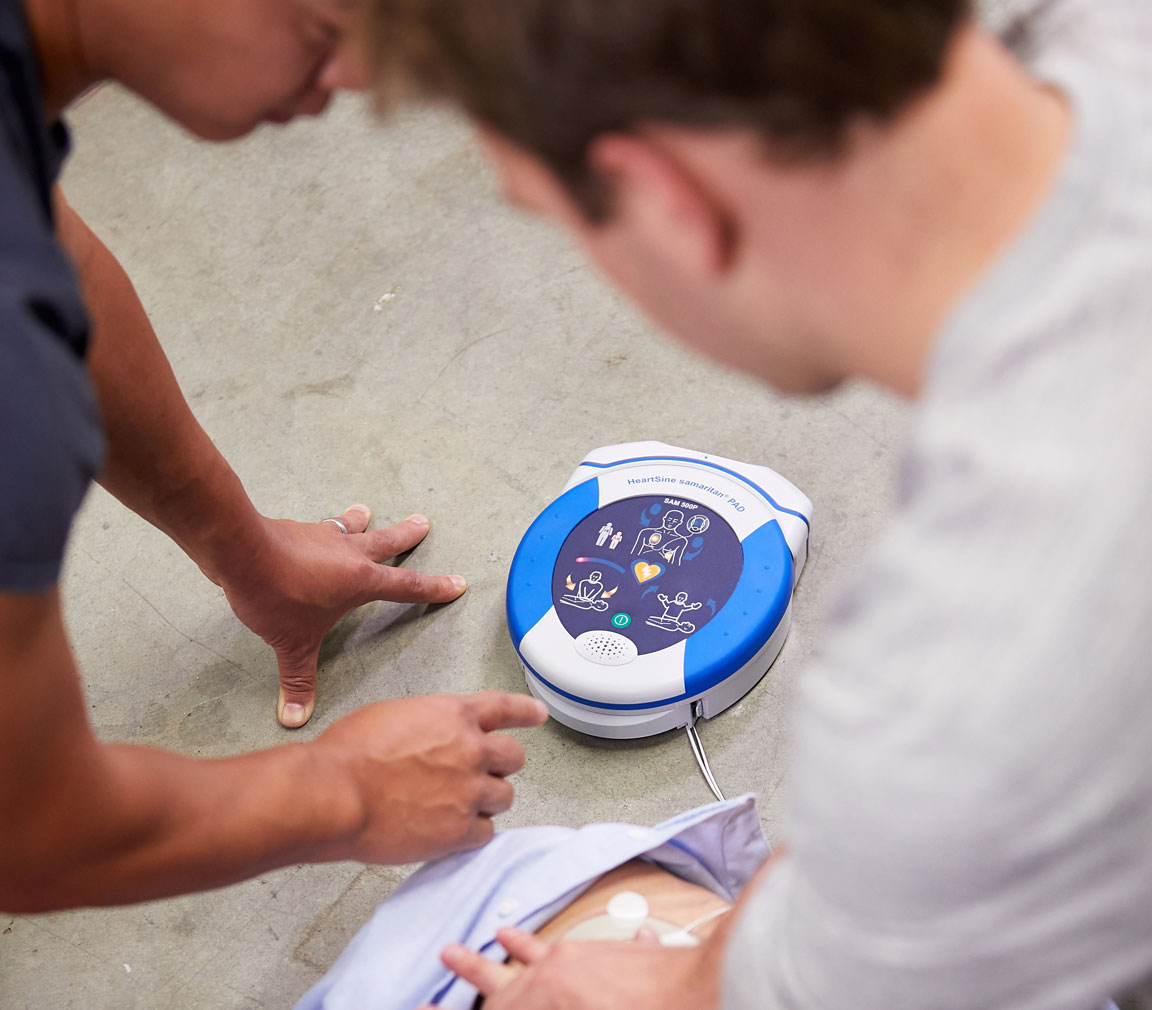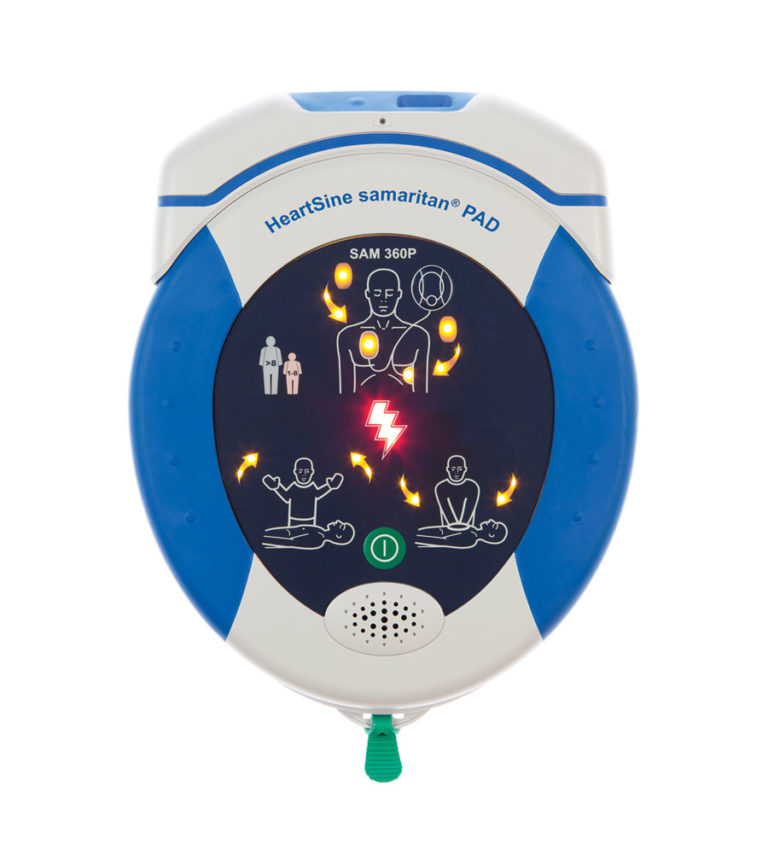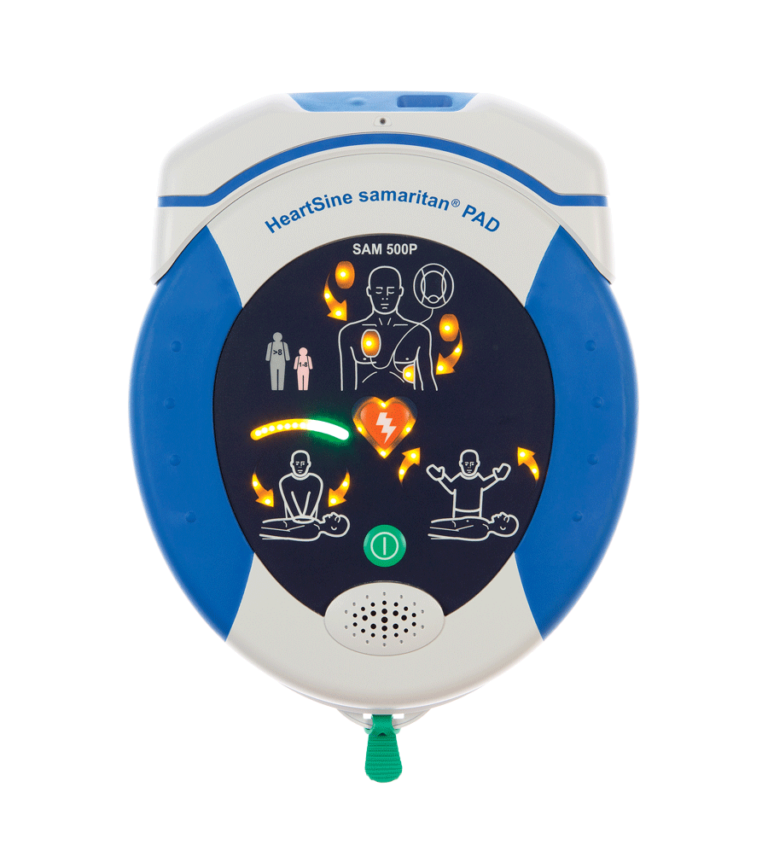What is a defibrillator?
A defibrillator, commonly known as a defib, AED or PAD (Public Access Defibrillator) is a device that delivers a high-energy electric shock to the heart of someone who is suffering cardiac arrest. This shock is called defibrillation and is an essential part of trying to save their life.
Defibrillators can commonly be found in offices and public spaces such as leisure centres, shopping centres and schools.
Do I need a defib on site?
According to the British Heart Foundation, there are over 30,000 out-of-hospital cardiac arrests (also known as heart attacks) a year where emergency medical services attempt to resuscitate the victim.
The survival rate however is very low, only 1 in 10 people in the UK survives an out-of-hospital cardiac arrest¹.
A defibrillator can increase the chances of sudden cardiac arrest survival by up to 75%².
It is common practice for businesses to carry out a first aid needs assessment to determine the level of provisions they need to take to protect their workforce and the public so this is up to the person(s) responsible for health and safety at your company to decide.
However, it is important to note that strenuous extortion does increase the immediate risk of sudden cardiac arrest and with construction sites often having difficult-to-access areas, a defibrillator can be crucial to protecting your workforce in a situation where every minute counts.


How to train your workforce in using a defibrillator and CPR
There are many online resources and organisations which offer first aid, CPR and defibrillator training, here are a few:
- British Heart Foundation
- RevivR™ (BHF) - Free CPR training in 15 minutes
- St John's Ambulance
- British Red Cross
Many people assume that operating a defibrillator requires expertise and is complex, but that’s not the case. Operating a defib is very simple; they have been designed so that anyone could use them, increasing the chances of lives being saved.
The British Heart Foundation has produced the video opposite explaining what a defibrillator is and how it is used - it's well worth a watch.
Which defibrillator is right for me?
At CMT we supply two models by reputable defibrillator UK manufacturers, HeartSine. HeartSine make defibrillators that use clinically validated technology to make saving lives outside of a hospital as simple and effective as possible.
The two models available are the HeartSine Samaritan Automatic PAK 360P and the HeartSine Samaritan Semi-Automatic 500P - comparison below.
| HeartSine Automatic 360P | HeartSine Semi-Automatic 500P | |
 |
 |
|
| Compact, portable, lightweight (1.1 kg) | Yes | Yes |
| Integrated battery and electrodes for one-change maintenance | Yes | Yes |
| Four-year electrode life | Yes | Yes |
| Pediatric compatible | Yes | Yes |
| Shock delivery | Fully Automatic | Semi-Automatic (operator needs to press the shock button when advised) |
| Audible and visual prompts for use in noisy environments such as construction sites | Yes | Yes |
| Integrated CPR Advisor (ICG-based CPR feedback) |
No | Yes |
| Patented low escalating energy protocol (SCOPE™) | Yes | Yes |
| ECG recording time | 90 Minutes | 90 Minutes |
| Automatic self-test | Yes | Yes |
| Pack includes | Wall cabinet, sign, carry case and prep kit | Wall cabinet, sign, carry case and prep kit |
| Advantages |
- Clear concise instructions throughout the process - Even a hesitant rescuer can use the defib as they will not be required to push a shock button |
- Clear concise instructions throughout the process - More control over when a shock is delivered |
Where to buy defibrillators
There are many suppliers of defibrillators online - here at CMT, we've hand-selected the above two models by HeartSine, both of which are available to buy online and have delivered the very next day!
¹ https://www.bhf.org.uk/what-we-do/policy-and-public-affairs/transforming-healthcare/out-of-hospital-cardiac-arrests
² Valenzuela TD, et al. 2000. Outcomes of Rapid Defibrillation by Security Officers After Cardiac Arrest in Casinos. New England Journal of Medicine. 343:1206-09.
Once purchased, don't forget to register your defibrillators
Once your defibrillator is purchased, on-site and in service, ensure you register to The Circuit by the British Heart Foundation.
The Circuit is a defibrillator network created by the BHF which allows individuals and emergency services to quickly and easily find defibrillators when needed.
This infrastructure is crucial for saving lives as unfortunately, less than 5% of out-of-hospital cardiac arrests receive bystander defibrillation. Registering defibrillators to the circuit network allows them to be found and used.

